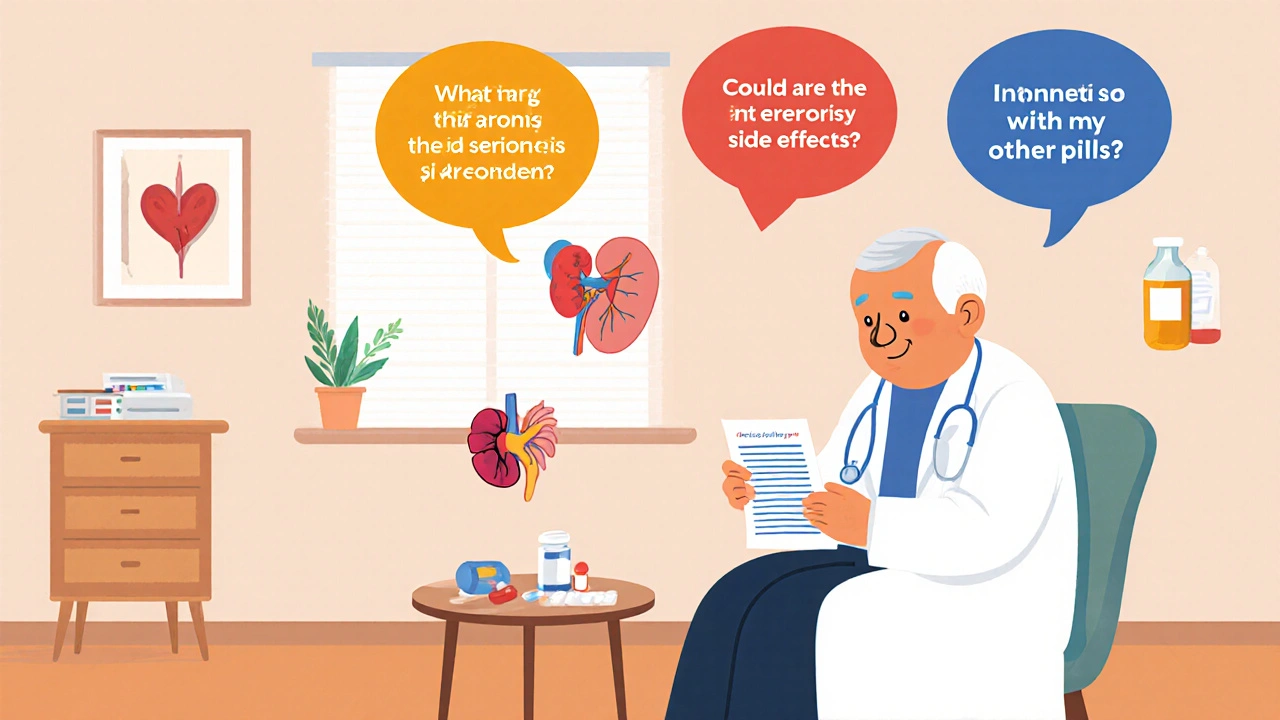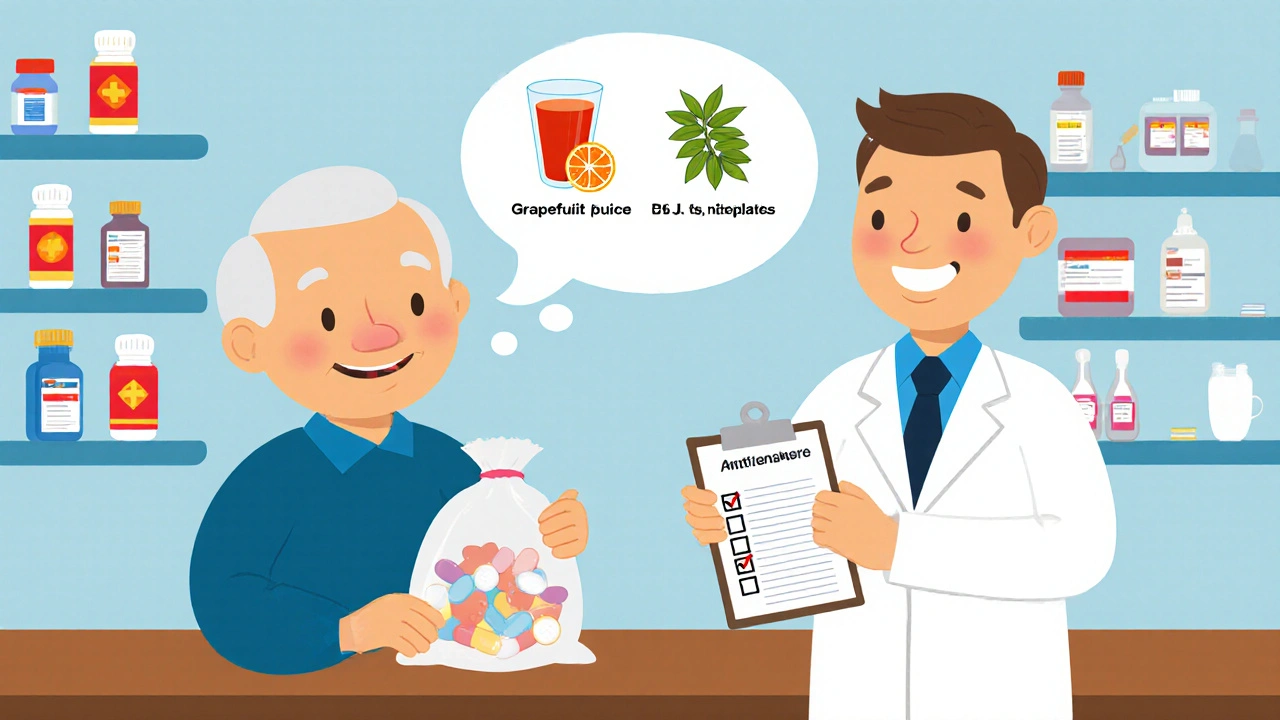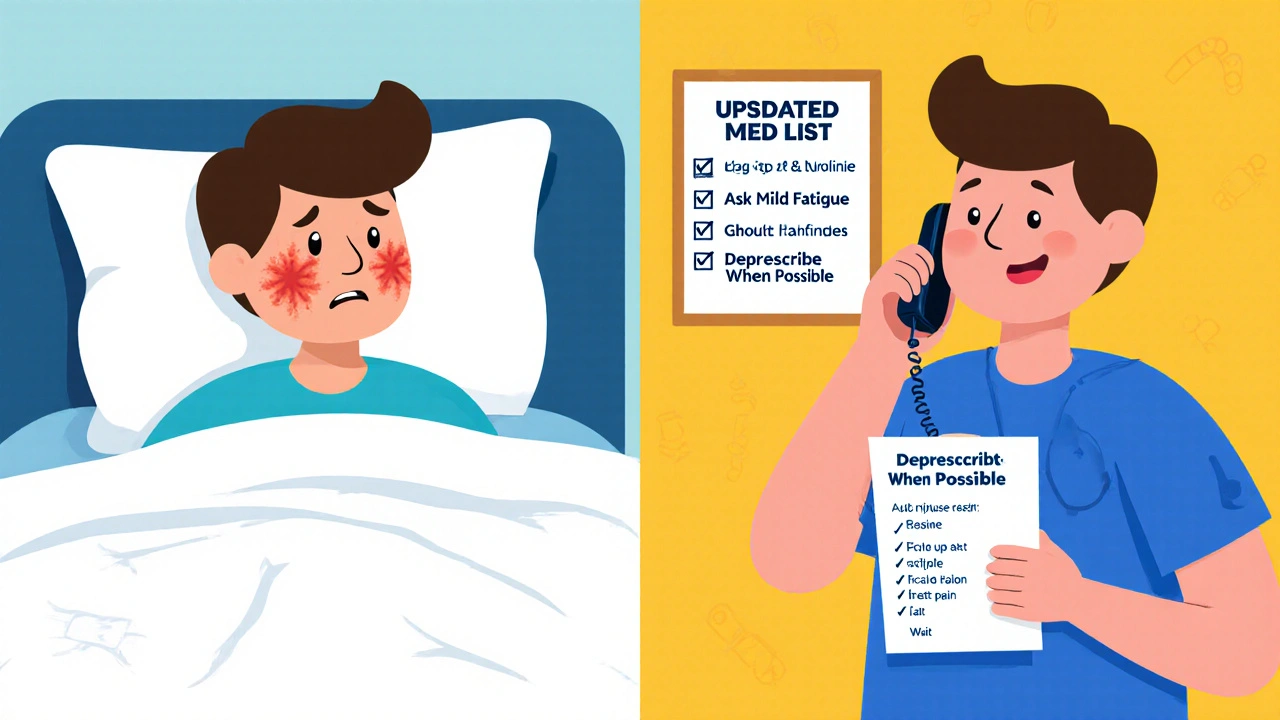Questions to Ask Your Doctor About Medication Side Effects
 Oct, 29 2025
Oct, 29 2025
Medication Question Builder
What Medications Are You Taking?
Enter the names of your medications (prescription, over-the-counter, vitamins, or supplements) to get tailored questions for your next doctor visit.
Why This Matters
A 2023 study found that patients who ask about side effects are 37% less likely to have a preventable bad reaction. Knowing what to ask can save your life.
Your Personalized Questions
These questions are tailored to help you discuss medication side effects with your doctor. Print this list and bring it to your next appointment.
Every year, over 1.3 million people in the U.S. end up in the emergency room because of unexpected reactions to medications. Many of these cases could have been avoided - not with better drugs, but with better questions. If you’re taking even one prescription, you need to know what to ask your doctor about side effects. This isn’t about being difficult. It’s about staying safe.
Why You Need to Ask About Side Effects
You might think your doctor already knows everything about your meds. But here’s the truth: doctors see dozens of patients a day. They’re rushing. And even the best ones miss things. A 2023 study found that nearly half of patients don’t remember being told about possible side effects after a new prescription. That’s not negligence - it’s system overload. The real danger isn’t just nausea or dizziness. It’s the hidden risks: a blood thinner mixing with an over-the-counter painkiller, an antidepressant making your heart race, or a diabetes drug worsening kidney function. These aren’t rare. They happen every day. And the people most at risk? Older adults taking five or more medications. One in four adults over 65 are in that group. That’s called polypharmacy. And it’s where things go wrong. Asking the right questions doesn’t make you a burden. It makes you a partner in your care. Research shows patients who ask about side effects are 37% less likely to have a preventable bad reaction. That’s not a small number. That’s life-changing.What Are the Side Effects?
This seems obvious, but most people don’t ask it clearly. Don’t just say, “What are the side effects?” Say: “What are the most common side effects? And which ones should I worry about right away?” Some side effects are mild - dry mouth, a little fatigue, an upset stomach. Others are serious. The FDA defines serious side effects as those that cause:- Death
- Life-threatening situations
- Hospitalization
- Disability
- Birth defects
What Can I Do About Side Effects?
Not all side effects mean you have to stop the medicine. Many can be managed. But you won’t know how unless you ask. Take metformin, a common diabetes drug. About 20-30% of people get stomach cramps or diarrhea when they start it. But if you take it with food, those symptoms drop by half. That’s not common knowledge. It’s not on the label. You have to ask. For dry mouth - a side effect of many antidepressants, blood pressure pills, and antihistamines - chewing sugar-free gum or sipping water throughout the day helps. For dizziness, standing up slowly and avoiding alcohol can make a big difference. For constipation, increasing fiber and water intake often works better than another pill. Your doctor doesn’t need to have all the answers. But they should know where to point you. Ask: “Is there a simple change I can make to reduce this?” Sometimes, the fix is easier than you think.Are There Alternatives?
Not every drug is the only option. There are often multiple pills that treat the same condition - and some have fewer side effects. The Beers Criteria, used by doctors to guide safe prescribing for older adults, lists 56 medications that are often inappropriate for people over 65. That includes certain sleep aids, antihistamines, and bladder medications that can cause confusion, falls, or memory loss. If you’re on one of these, ask: “Is there another medicine that works just as well but doesn’t carry this risk?” For example, instead of diphenhydramine (Benadryl) for sleep, melatonin might be safer. Instead of an older antidepressant that causes dry mouth and constipation, a newer one might not. And don’t assume brand name is better. Generic drugs are just as effective. In fact, they’re often cheaper - up to 89% cheaper. Ask: “Is there a generic version? Is it just as good?”
Do I Still Need to Take This Medicine?
This is the question most people never ask. And it’s the most important. Many people stay on medications long after they’re needed. A 2023 Cochrane Review found that 15.2% of prescriptions in older adults are continued without a clear reason. Maybe your blood pressure improved. Maybe your pain is gone. Maybe the original reason for the drug doesn’t apply anymore. Ask: “When was the last time we checked if this is still helping?” Some medications, like proton pump inhibitors (PPIs) for heartburn, are meant for short-term use. But many people take them for years. Long-term use can lead to nutrient deficiencies, bone loss, and kidney problems. Deprescribing - slowly stopping unnecessary meds - is a real and growing part of good care. It’s not quitting. It’s cleaning up.Could This Medicine Interact With Anything Else I’m Taking?
You’re not just taking one pill. You’re taking a mix: prescriptions, vitamins, supplements, over-the-counter drugs, even herbal teas. The Lexicomp database tracks over 1,200 drug interactions. Some are dangerous. For example:- St. John’s Wort can make birth control, antidepressants, and blood thinners stop working.
- Ibuprofen can increase bleeding risk when taken with warfarin or aspirin.
- Grapefruit juice can make cholesterol drugs and blood pressure pills too strong - sometimes dangerously so.
Will This Medicine Make Any of My Other Conditions Worse?
If you have diabetes, heart disease, kidney issues, or depression, your meds can make those worse. For example:- Some beta-blockers for high blood pressure can hide low blood sugar symptoms in diabetics.
- Antidepressants like SSRIs can increase bleeding risk in people with liver disease.
- Decongestants can spike blood pressure in people with heart problems.

What Should I Do If I Notice Something New?
You need a clear plan for when things go wrong. Ask: “What symptoms mean I should call you right away? What can I wait on?” Write it down. For example:- Call immediately: chest pain, trouble breathing, swelling in face or throat, sudden confusion, severe rash.
- Call within 24 hours: persistent vomiting, unusual bruising, new irregular heartbeat, severe dizziness.
- Wait and monitor: mild headache, slight nausea, tiredness that fades after a week.
How Do I Take This Medicine Correctly?
Getting the dose right isn’t enough. Timing matters too. Ask: “Should I take this with food? On an empty stomach? At night or in the morning?” Some pills work better with food - like statins, which absorb better when eaten. Others, like antibiotics, can be ruined by dairy. Some must be taken at the same time every day, like birth control or thyroid meds. Missing one dose can throw off your whole system. Also ask: “What if I miss a dose?” Some meds need a double dose. Others should be skipped. Don’t guess.How Do I Keep Track of Everything?
You can’t remember it all. And you shouldn’t have to. Keep a simple, updated list of every medication you take - including the dose, why you take it, and when you take it. Update it within 48 hours of any change. Bring this list to every appointment - even if you’ve been going to the same doctor for years. Medication errors happen most often during transitions: after hospital discharge, after a specialist visit, when a new doctor takes over. The Joint Commission says 43.2% of medication errors happen during these handoffs. A written list cuts that risk in half.Final Thought: Your Voice Matters
You are the only person who knows how your body feels. No chart, no test, no algorithm can replace that. If a side effect feels wrong - even if your doctor says it’s “normal” - speak up. A 2023 study found that 41.3% of patients had their concerns dismissed, especially with antidepressants and sexual side effects. That’s unacceptable. You have the right to understand your treatment. You have the right to safety. And you have the right to ask questions - no matter how many times you’ve asked them before. Write your questions before your appointment. Bring your list. Speak up. Your life depends on it.What are the most important questions to ask about medication side effects?
The five most critical questions are: Why am I taking this medicine? What are the side effects? What can I do about side effects? Are there alternatives? And do I still need to take this medicine? These cover purpose, risk, management, options, and necessity - the core of safe medication use.
How do I know if a side effect is serious?
The FDA defines serious side effects as those that cause death, life-threatening situations, hospitalization, disability, or birth defects. If you experience sudden chest pain, trouble breathing, swelling, confusion, severe rash, or uncontrolled bleeding, seek help immediately. Mild side effects like dry mouth or fatigue are common but rarely dangerous.
Can I stop a medication if I don’t like the side effects?
Never stop a prescription without talking to your doctor first. Some medications, like blood pressure or antidepressant drugs, can cause dangerous withdrawal symptoms if stopped suddenly. Instead, ask your doctor if there’s a safer alternative or if the dose can be adjusted.
Should I bring a list of all my medications to every appointment?
Yes. Always. Include prescriptions, over-the-counter drugs, vitamins, and supplements. Medication errors happen most often during care transitions - like after hospital discharge or when switching doctors. A written list reduces errors by nearly half.
What if my doctor dismisses my concerns about side effects?
If your concerns are ignored, ask for a second opinion or ask to speak with a pharmacist. Many clinics now have medication therapy management services. You can also contact your local pharmacy - pharmacists are trained to review all your meds and can flag dangerous interactions or side effects your doctor may have missed.
Scott Dill
October 31, 2025 AT 13:02Bro this is the most important thing I’ve read all year. I had no idea so many side effects could be managed just by changing when you take the pill or eating with it. My grandma’s on like 8 meds and she just suffers in silence. Gonna print this out and hand it to her doctor next week.
MOLLY SURNO
October 31, 2025 AT 23:01This is an exceptionally well-researched and compassionate guide. It reflects the quiet crisis of medication mismanagement in our healthcare system, particularly among elderly patients who are often overlooked in brief clinical encounters. I hope this reaches every primary care provider in the country.
Emily Kidd
November 1, 2025 AT 01:52OMG I just realized I’ve been taking my blood pressure med on an empty stomach and now I’m dizzy all day. I thought it was just aging 😅 TIL I should take it with food. Also, I didn’t know grapefruit juice messes with statins-my mom drinks it every morning. Gonna tell her ASAP.
Justin Cheah
November 1, 2025 AT 19:38Let me guess-Big Pharma doesn’t want you asking these questions because if patients knew how many of these drugs are just profit machines with dangerous side effects they’d revolt. The FDA? Controlled by lobbyists. The 2023 study? Probably funded by pharma. They don’t tell you that 90% of ‘serious side effects’ are just the body rejecting synthetic chemicals it wasn’t designed to process. And don’t get me started on how doctors are trained to ignore symptoms that don’t fit their algorithm. Deprescribing? Yeah right. They’ll keep prescribing until you’re on 20 pills just to counteract the side effects of the other 15. Wake up people. It’s not medicine-it’s a business model built on chronic dependency.
caiden gilbert
November 2, 2025 AT 04:58I used to think side effects were just the price of getting better. Turns out they’re more like the hidden tax on modern medicine. This post didn’t just inform me-it rewired how I see my own prescriptions. I’m printing the checklist. Carrying it like a holy scroll to my next appointment. My body’s not a lab rat.
phenter mine
November 2, 2025 AT 06:14so i just found out my antidepressant was making my blood sugar act up and i had no clue 😳 i thought i was just stressed. gonna ask my doc about alternatives next week. thanks for this!!
Aditya Singh
November 3, 2025 AT 17:26While the article presents a surface-level heuristic framework for medication safety, it fundamentally neglects the epistemological asymmetry inherent in physician-patient dyads. The systemic inefficiencies cited are merely symptomatic of a broader ontological failure in biomedical hegemony. Polypharmacy, as a pharmacoeconomic artifact, is not mitigated by patient inquiry but by structural reform of formulary governance and prescriptive algorithmic bias. Your ‘checklist’ is a Band-Aid on a hemorrhage. The real issue is the commodification of pharmacological intervention within neoliberal healthcare paradigms. Until we deconstruct the profit-driven pharmacopoeia, your ‘questions’ are performative activism.
Katherine Reinarz
November 4, 2025 AT 04:06my doctor laughed at me when i asked if my anxiety meds could be making my hair fall out. i cried in the parking lot. then i went to a pharmacist and she said ‘oh honey, that’s super common’ and gave me a free sample of a different one. now i’m not bald and i’m not crying. why do doctors act like we’re dumb? why do they think we should just suffer? i’m not a robot. i feel things. i deserve better.
John Kane
November 5, 2025 AT 20:06Hey everyone-just wanted to say thank you to the person who wrote this. Seriously. This isn’t just advice, it’s a lifeline. I’m from rural Oklahoma and my mom’s on six meds. She’s 72, doesn’t drive, and trusts her doctor like a priest. I printed this out, highlighted the questions, and we went through it together last Sunday. She asked her doctor about stopping her old sleep pill-and he said yes! Said he’d been meaning to bring it up. That’s the power of showing up. You don’t need to be loud. You just need to be prepared. If you’re reading this and you’re caring for someone older, do this. Bring the list. Write the questions. Don’t wait for permission. You’re not being difficult-you’re being brave. And if you’re a doctor reading this? Thank you for listening. Keep doing it. We see you.